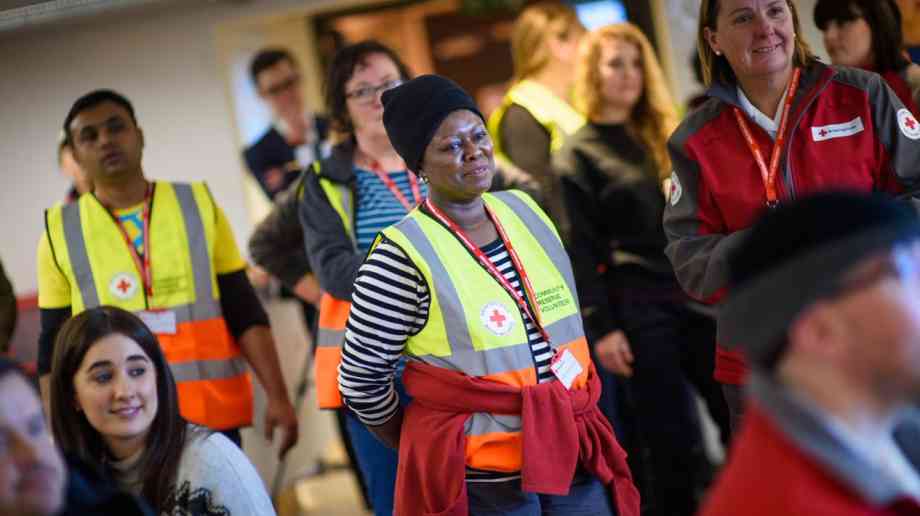Sue Robb of 4Children talks to Julie Laughton and Alison Britton from the Department for Education about the role of childminders in delivering the 30 hours free entitlement.
Calls for law change in emergency response

The British Red Cross is calling for the law to be updated to give individuals and communities more say in how they are treated and the support they get in an emergency.
Emergency services, government bodies and councils, who together are responsible for planning for emergencies, aren’t currently legally bound to involve voluntary and community groups. Therefore, local knowledge about needs, vulnerabilities and sensitivities may not always be known or taken into consideration.
In its latest report, People Power in Emergencies, the British Red Cross looks at how far local resilience forums, which lead local council emergency planning, factor in the knowledge, skills and capacities of the voluntary and community sector. It finds that collaboration is variable, meaning responses to emergencies tend to focus chiefly on 'command and control' mechanisms, which whilst important, can allow for missed opportunities to mobilise people power encouraging communities to build their resilience and support their recovery from within.
One of the report’s key recommendations is for an urgent review of the 2004 Civil Contingencies Act. The British Red Cross is calling on whoever wins the upcoming General Election to update the act to enshrine in law the role of the voluntary and community sector in emergencies.
Other recommendations in the report include: a 'people at the heart of planning' checklist for local resilience forums, produced by the British Red Cross, and championed by the recently formed voluntary and community sector Emergencies Partnership; and a further amendment to the Civil Contingencies Act, Regulations and Guidance to require local resilience forums, in partnership with the voluntary and community sector, to plan what the report calls a more ‘person-centred’ approach to preparing for and dealing with disasters and emergencies.
The British Red Cross is calling on local authorities and the voluntary and community sector to work with it on the report’s recommendations, and to see the law amended urgently.
Mike Adamson, CEO of the charity, said: ‘Our own response to the recent floods across Yorkshire and the Midlands has shown the value we bring, whether supporting fire and rescue to distribute sandbags, or welcoming people who’ve been flooded out of their home into rest centres. This is about showing how we complement the work of our partners. It’s also about giving a voice to those affected by emergencies and highlighting local challenges, sensitivities and opportunities to help people survive and recover better.
"It’s people and communities who know best what their needs are and how they want them addressed. They are the experts in who may be seriously ill, have a disability or mobility issue, or face difficulties because of language barriers, poverty, immigration status or anything else. By listening harder and tapping into that resource, people will have the best possible chance of survival and recovery. By updating the law so that statutory agencies work more with communities and the voluntary sector, people’s immediate needs will be met more easily, in the most appropriate way.”
Dr Andy Johnston, Chief Operating Officer of the Local Government Information Unit (LGIU), and Convenor of the Local Government Flood Forum, has welcomed the report: “It is very timely, given the recent emergency response to flooding in the North of England and the Midlands. Emergencies in the UK are evolving, with climate change and threats of terrorism, and are very complex, affecting both communities and councils. I am therefore pleased to see the recommendation for reviewing the legislation to better guide the local agencies in their planning for emergencies.
“In my roles as part of the LGIU and Convenor of the Local Government Flood Forum, I very much look forward to working more closely with both councils and the voluntary and community sector to take forward these insights and recommendations to ensure community insight is key to local government emergency planning.”
Company Focus
The Isuzu D-Max is a rugged workhorse that can fulfil a myriad of purposes as both a business and personal vehicle. Consequently, the D-Max is a particularly popular choice when it comes to farming, construction, and trade industries. Uncompromising in nature, the D-Max strives to be the ideal companion for many business needs.
Event Diary
UKREiiF has quickly become a must-attend in the industry calendar for Government departments and local authorities.
The multi-award-winning UK Construction Week (UKCW), is the UK’s biggest trade event for the built environment that connects the whole supply chain to be the catalyst for growth and positive change in the industry.
Supplier Profiles
Geo Energy
At GeoEnergy Design, we're on a mission to disrupt the traditional way heating and cooling ha
Latest Features
Professor Harith Alani, director of the Knowledge Management Institute at the Open University explains how AI can be used for good and bad.
Alex Lawrence, head of health & social care, techUK sets out techUK’s Five Point Plan for CareTech.

















